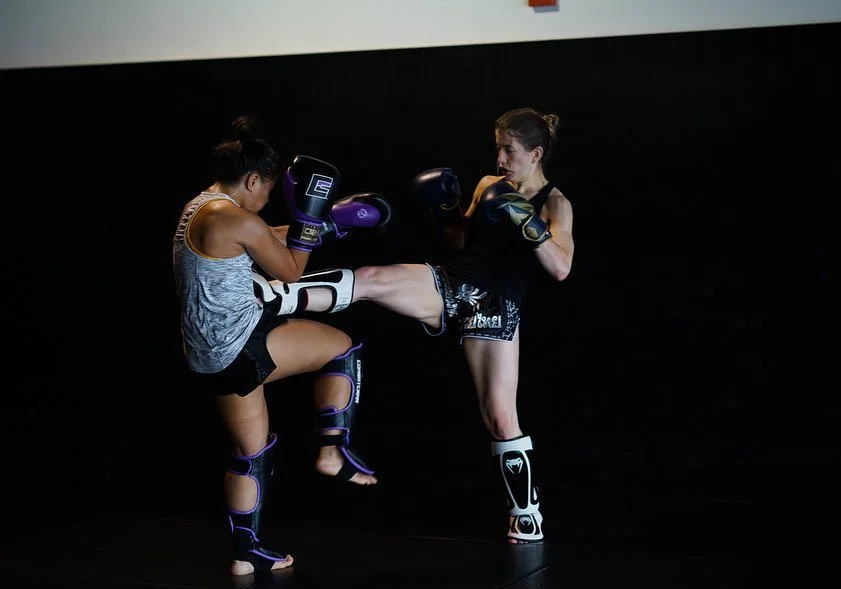The Codependent Fighter
Physically Strong, Holistically Fragile
My Experiences as a Codependent Fighter
I used to believe that one of my greatest strengths was that I could put my head down and do whatever was asked of me—no questions. I was willing to do anything if it would help me get to improve my Muay Thai. If I had trainers who I trusted, why shouldn’t I do anything that they said?
As I’ve healed more, I’ve realized that was a result of my upbringing. I substituted the controlling parents or strict religious leaders for my trainer. So, while the activity was physically healthier, I was still leaning into codependency, trusting someone else to know what was best for me.
The fear of not being or doing enough haunted me. If I took a rest day or had to miss training, I felt I was a failure and would disappoint my trainer. And that I would miss out on opportunities or potentially be punished in other ways if I didn’t meet their expectations. This belief led me to overtrain and develop injuries because I wasn’t taking proper care of my body. Not only that, but my recovery also suffered. I would only take time off when sent home by a coach because I wanted them to see I was trying my best and not just being ‘lazy’. Those hours could have been spent sleeping or providing myself with other needed self-care, so my next training session would be more effective.
None of this was explicitly said to me by the coaches. However, there were undertones in the judging remarks when people weren’t consistent, took ‘too much’ time off, or didn’t run. While I don’t think it was their intent, I internalized the need to never do any of those things.
My belief that I was enough or that I did enough was still dependent on external validation. That dependency did allow me to excel as a fighter, but, internally, it left my mind and body war-torn. Falling into eating disorders and unhealthy mindsets of not being enough if I didn’t meet the ambiguous criteria.
Understanding Codependency
Codependency can be defined as any relationship in which two people become so invested in each other that they can’t function independently anymore. Your mood, happiness, and identity are defined by the other person. There is usually one person who is more passive and can’t make decisions for themselves and a more dominant personality who gets some reward and satisfaction from controlling the other person and making decisions about how they will live.
Signs of Codependency Include:
Difficulty making decisions in a relationship.
Difficulty identifying your feelings.
Difficulty communicating in a relationship – This could be out of fear of their response or disappointment.
Valuing the approval of others more than valuing yourself.
Lacking trust in yourself and having poor self-esteem.
Having an unhealthy dependence on relationships, even at your own cost.
Having an exaggerated sense of responsibility for the actions of others.
Examples in the Gym:
Fear or ultimatums could be used overtly or covertly to incentivize the coach’s preferred behavior
Looking to your coach’s direction on if you can be proud of a fight or technique more than your own
Inability to ask for time off due to injury, listening to your body, family trips, etc.
Taking on the role of pushing others in the gym to follow certain behaviors – examples are seen in the “Ideal Follower Trope” From Under the Ropes’ article ‘Why it’s so hard to leave a toxic Muay Thai Gym’
My Game Plan Moving Forward
You can’t truly test your mind, body, or soul without being faced with the elements you lack. I couldn’t truly know that I reached body neutrality until I gained significant weight without training and could still look at myself with love and appreciation for all that my body did for me. As long as I stayed small and fit, I wouldn’t truly know if I loved my body when it wasn’t that way.
When I moved to Thailand, I was returning to Muay Thai from a two-year hiatus of consistent training. During my time off I grew mentally, and emotionally, but my physical fitness wasn’t at the same level. Deciding to come back, I set specific goals, so I could return to the fitness level while maintaining that growth.
Stay on track with having overcome my eating disorders, and enjoy sweets, carbs, and salt along the way. I would only restrict eating during the week of weigh-ins. My focus was not on being as small as possible anymore but on finding a healthy weight that supported my strength and wouldn’t take an unbearable toll on my body and mind.
Listen to my body and trust my experience. I knew that there were other methods for cutting weight or recovery that I personally don’t think are good for my body, but might be popular practices in the Muay Thai community and Thailand. I have reminded myself that if something doesn’t feel right, I have the right to say no and follow my methods. This is never meant with disrespect because every bit of guidance is given with the goal to help, but that doesn’t mean it’s right for me. I can still be respectful and appreciative of my trainers without doing everything they say.
The best relationships are partnerships. A coach who guides and directs, but not commands. A fighter who listens to their body and communicates their needs and desires. Boundaries are set in place so that there is no confusion about what guidance is appropriate and acceptable to the fighter, while still showing respect for the trainer and gym. Trust is essential between the trainer and fighter—built over time as each person communicates expectations and needs and then shows up accordingly.
Overcoming Codependency – Boundaries Are Key
Overcoming my codependent tendencies hasn’t been quick and easy. I was taught to be self-sacrificing, meaning, people – especially people I care about - deserve to be treated and know from my actions that I value them. Always give everybody the benefit of the doubt and forgive endlessly, do not complain that they hurt me, or set a boundary to protect my own feelings. Finally, absolutely always listen to authority figures: in church, home, school, etc. they must know better than me, why else would they be in positions of authority? ***Insert knowing laughs.
Rewiring years of coping mechanisms I developed in childhood to help me feel safe has been hard. I still have moments of fear and anxiety and don’t always know immediately how I want to proceed.
During my first fight camp after the hiatus, I was executing my plan for the weight cut. The day before weigh-ins, I was on track and talking with the team in the gym, when my coach recommended I use the sauna suit - something I knew I didn’t need and didn’t want to use unless necessary. My initial instinct was ‘I guess I better do what he said.’ Even though I expected and planned for this very situation, my codependent tendencies crept out. I nodded returning to my room for a mental battle - listen to my coach or myself. After some contemplation, I spoke to a friend about it, and she reminded me, “No one knows your body better than you.” That was all I needed to feel at peace following my plan. I made weight on track the next day, reaffirming that belief.
Healing from codependency means rebalancing ourselves. First, we need to take the time to know ourselves and our own needs, wants, and goals, then prioritize them, rather than focusing on solely others. Remind yourself that your needs and wants are as important as other people’s. If you don’t take care of yourself, you’ll end up depleted, resentful, and unfulfilled.
Once you know what you need, the next step is asking for it. Assertive communication and setting boundaries are intimidating but will protect us from being mistreated and develop reciprocal and meaningful relationships, not only with others but with oneself. These boundaries don’t always have to be confrontational, sometimes a simple smile and following through with your process is sufficient. Though you are working to heal from codependency, it doesn’t mean you need to do it alone. Good friends who support your goals can be crucial to working through situations and can provide that validation, from an outside perspective as you’re rebuilding trust in yourself.
As long as you’re trying, you will improve. The same way I show up to train every day and improve my technique is the same way I work to show up for myself every day. Some days I struggle with the technique and I make mistakes, but the muscles are growing, and I am improving even when I don’t feel it. There are days I still have urges to fix things or follow others to keep them happy (whether it’s what they are asking for or not). Sometimes I follow the urges and others I catch myself enforcing my boundaries like it is second nature—because now it is.
Below are some slides I created for posts on my @womenofmuaythai Instagram page with more details on boundaries - what they are, how to set them, and examples in a gym.
Stronger Person, Stronger Fighter
When I lost Muay Thai, I felt lost. I didn’t have an identity if I wasn’t a fighter, and I couldn’t call myself a fighter if I wasn’t training or fighting. I fell into a deep depression. Along with my favorite coping mechanism, I lost my social circle and purpose in my life.
Because my favorite thing about myself was fighting, I sacrificed experiences with friends and family and focused solely on training. I wanted to make up for the fact that I was starting at 24, hoping those extra hours would help me grow exponentially, but any gains I achieved were marginal and led to burnout. The truth is you can’t pressure-cook training or experience in Muay Thai. Extra hours in the gym are beneficial to an extent, but cannot compare to years of consistent practice. Though I was known as the most diligent fighter at the gym, I wasn’t living up to being the sister, aunt, or individual I wanted. As much as I was grateful for the practices that Muay Thai gave me to heal and grow, it wasn’t the sole answer. Unless I practiced setting boundaries, healing relationships, and having hard conversations, I wouldn’t work those muscles.
Since then, I’ve connected with myself and my loved ones on a deeper level. I worked on healing without relying on attachments to any one thing and embraced the various activities I enjoy on the regular. Muay Thai is still the main focus, but I actively set aside time to video chat with family and friends back home, go dancing, read and write poetry and explore other hobbies when I have the time.
The reality of the world is everything is uncertain, and anything can be taken from us at any time. That statement used to fill me with fear, but today it gives me the courage to prioritize myself and my values with balance. I’m a far happier person now, and it shows in how I carry myself.
I’m chasing a beautiful dream of fighting, but I’m so much more than just a fighter, and I’m a better fighter because of it.
Resources:
https://www.everydayhealth.com/emotional-health/do-you-have-a-codependent-personality.aspx
https://www.verywellmind.com/what-is-codependency-5072124
https://www.psychologytoday.com/us/blog/conquering-codependency/202010/how-conquer-codependency























